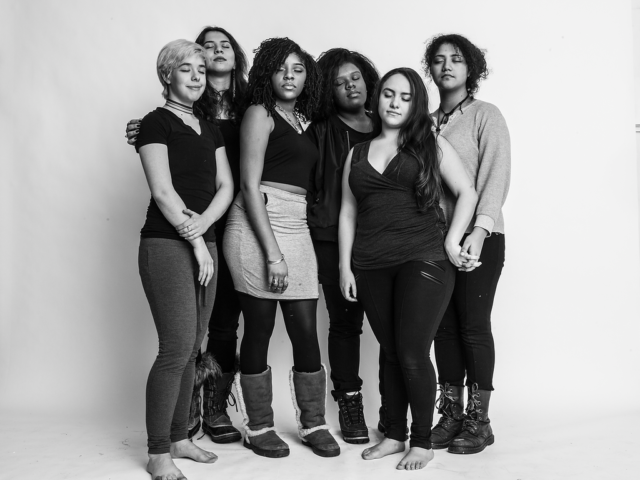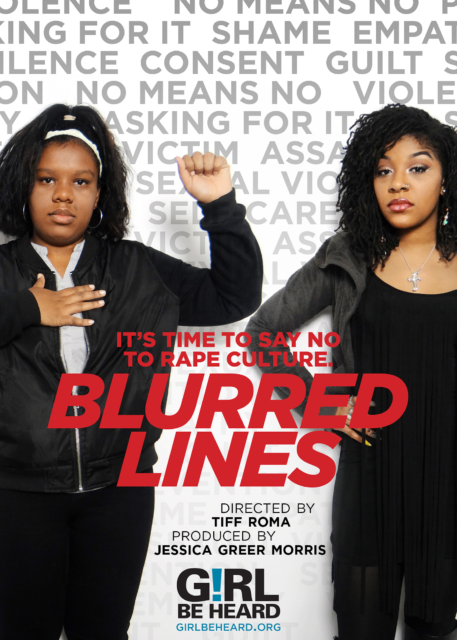In my work as a sexual assault and domestic violence survivor advocate, people often ask me how we can put an end to rape culture. A question to which there is no definitive answer. Girl Be Heard tackles this difficult question with their latest live performance “Blurred Lines.”
Girl Be Heard is an organization that uses theater as a vehicle to empower young women to become brave, confident, socially conscious leaders and explore their own challenging circumstances. Tiff Roma has been a part of the organization for many years as a company member, and this show is her first experience as a director.
“The foundation of Girl Be Heard is creating a safe space, the power of collaboration is that we are stronger, more dynamic and thoughtful together,” Roma told GO. “Therefore, my focus was on building the space for the collective to be able to really see each other in their complexities and to be able to take care of each other throughout the process.”
Roma said she recognized that talking about and performing scenes that display the pervasiveness of rape culture can take a toll on people, so the cast started each rehearsal with check-ins where everyone had space to laugh, love, be angry or whatever it was they needed to release on that day.
Watching “Blurred Lines” filled me with a plethora of emotions from the moment I walked into the theater. I was handed a fact sheet filled with statistics I have known for a long time. Living in this country as a queer woman, you often have no choice but to face that harsh reality that 1 in 5 women and transgender individuals will be sexually assaulted in college and that 33% of men have said they would date rape someone if their rape went undetected by using drugs. “Blurred Lines” did not shy aware from these facts in their performance.

“This show is a mirror, and we are asking the audience to look at their reflection because we cannot change the world until we change ourselves,” Roma said. As a member of the LGBTQ community herself, Roma made intersectionality a priority in the stories told on stage. “Narratives, in general, tend to be heteronormative and sexual assault is no different. The process of this show started with a lot of questions, to ourselves, to each other, and to other people. Since our cast has a full spectrum of identities with various experiences, the work reflects that.”
Some of my favorite scenes throughout the 60-minute performance were from actor Jesse Robes Krebs, who brought to light many different experiences, made clear their understanding of healing was empathetic, and how rape culture touches us all.

“To have times where my narrative as a nonbinary human was centered, and other times where I had the honor to be witness to all of the other narratives, and be able to take in all of our similarities and differences—what an incredible journey in coming to terms with what rape culture is and how to fight it,” Krebs told GO. “We can’t solve this alone, but we also have to acknowledge everyone’s experiences within the structure of privilege and oppression to move forward.”
“Blurred Lines” not only uses the power of words to convey a call to action to end rape culture, they also integrated movement and dance throughout the performance. Choreographer Ian Stewart told GO, “Words carve a specific journey for the audience which we find entry points into for our own narrative throughout that journey. Movement creates an emotional architecture which every audience member can superimpose their story onto.”
The process of reclaiming autonomy is an important step in healing for many survivors. “Each actor has come to this piece with different baggage given to them by a society that continuously strips them of bodily autonomy,” Stewart said. “It is my job as the choreographer to provide the space for them to reclaim some of that autonomy and shape the piece as a whole to better serve the piece.”
As a member of the cast, Ray Marie Johnson hopes that the “the play urges audience members to take action by not only opening up a dialogue about rape culture but by providing examples of specific language and behavior that can be used to help survivors and prevent rape and sexual assault.”
You can see “Blurred Lines” at HERE Arts Center until Sunday, February 19. If you are a student and would like to request a performance at your school/university, contact Girl Be Heard.

What Do You Think?